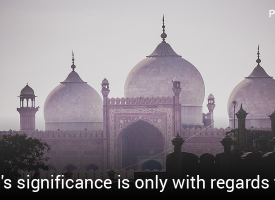Tag "Islam and Pakistan"
There have been many calling out for a unanimously agreed platform for a more close-knitted Muslim world. Especially with Muslim countries undergoing extreme security situations, a desire to build a NATO-style Muslims-exclusive army seems like a desperate option, yet useful at a time of collective devastation descending over the Muslim world. There is next to no doubt about the fact that Muslims are under a cloud of grievous curse, an
The following is a concise English translation of an Urdu column by Allama Abul Imtiaz Ain Seen Muslim for Daily Nawa-i-Waqt dated January 21, 2012. ****** There is sufficient evidence to prove that Pakistan owes its very existence to Divine Commandment. That 15 million Muslims from oppressed Muslim societies in India united together on one platform raising one demand (attaining Pakistan) is proof enough that Allah wants to employ Pakistan
The following is a concise English translation of excerpts from a book titled ‘Seerat-Un-Nabi (SAW) Baad Az Wisaal-Un-Nabi SAW – Part 7′ authored by Abdul Majeed Siddiqui. ****** A few days after the creation of Pakistan, Syed Safdar Ali Ahmed saw a dream in which an innocent boy named ‘Pakistan’ is standing in a saint’s presence wearing shiny white clothes. He continued narrating his dream: “It came to my knowledge
The following is a concise English translation of an Urdu column by Dr. Safdar Mehmood for Daily Jang dated July 21, 2015. ****** Fundamentally, man is prone to notice things which are obvious; he has a tendency to judge things from their outward or “apparent” looks. This is why I advise my friends time and again that when studying historical figures, they shouldn’t focus on their apparent features; instead, they
Before I get into the contents of this article in detail, a few things need to be clarified beforehand. This article specifically addresses Muslims in Pakistan who belong to the Sunni and Shia schools of thought. There are several sub-sects in these respective schools of thought; for example, Barelvis, Deobandis, Salafis/Wahhabis etc come under the umbrella of ‘Sunni’ whereas Ithna Ashari (Twelvers), Zaidis, Ismailis, etc come under the umbrella of
When the foundation for Pakistan was solidified with the passing of the Lahore Resolution in 1940, the Muslims in the Indian Subcontinent were (righteously) led to believe that Pakistan would be a separate homeland where they could freely exercise Deen (Islam as a way of life). Pakistan was seen as a homeland for all Muslims irrespective of their sectarian denominations/schools of jurisprudence. What was common among them all was the
Qudrat Ullah Shahab, popularly known as ‘Q.U. Shahab’, was one of Pakistan’s most legendary civil servant and Urdu writer. Shahab’s most notable appointments after migration to Pakistan from the Indian Civil Service were Principal Secretary to Governor Generals Ghulam Muhammad, Iskander Mirza and Field Marshal Ayub Khan’s regimes. In 1962, he served as Ambassador of Pakistan to The Netherlands and later as Secretary of Education. During the early days of
One of the more important reasons for the formation of Pakistan was the need for a separate religious identity for the Muslims of the Sub-continent. Islam was hence declared the state religion in 1973. This was considered a logical move as 95- 97 percent of the population is Muslim, and there was a need to counter the otherwise secular nature of the constitution. Pakistan had a brief flirtation with religion







